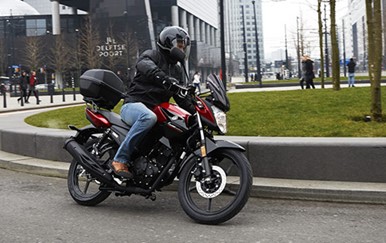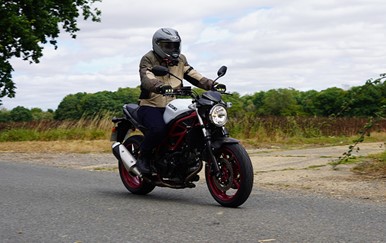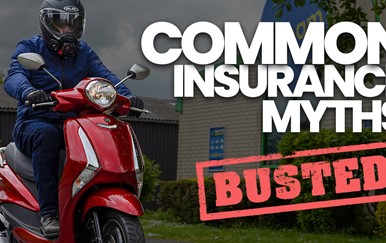Whether you’ve just passed your test and looking to purchase your first year of insurance, or perhaps you’re a seasoned rider who is not yet clued up with the lingo of insurance documents, you’ll be pleased to know you’re in the right place…
In this blog, we are going to be running down everything you need to know about motorcycle insurance and what to expect when setting up a policy.
So without further ado - let’s get into it!

Motorcycle insurance and the law
Regarding motorcycle insurance, UK laws are stringent, so it is important to follow the rules to keep you and other road users safe. We have briefly discussed this topic in our UK law and electric motorbikes blog, however let’s explore further:
Why do you need motorcycle insurance?
If you intend to ride on UK roads, it is a legal requirement that you must obtain a minimum of third-party-only motorcycle insurance.
What does motorcycle insurance cover?
When it comes to motorbike insurance, as a general rule, there are three levels of insurance coverage you can get on your motorbike. Each one of these will cover slightly different things:

Third Party Only (TPO)
Third-party-only insurance, also known as TPO is the minimum level of coverage you are legally required to have if you intend to ride your two-wheeler on UK roads.
TPO will provide cover for any damage you may cause to a third party’s person or property, however, will not cover you for your own vehicle if it is damaged in the event of an accident.
Third Party, Fire, and Theft
Third Party, Fire, and Theft insurance includes coverage for everything under Third Party, but also allows you to claim off your own policy should your vehicle be stolen, or damaged as a result of a fire.
Comprehensive
The last level of coverage is comprehensive insurance. Fully comp insurance enables you to claim for accidental and malicious damage to your vehicle, including vandalism, a single-vehicle incident, or flood damage.
Can I get insurance on a motorcycle without a licence?

Here at Lexham, you will not be able to get an insurance policy for your motorcycle until you have passed your CBT (Compulsory Basic Training) at minimum.
If you have bought a bike before getting your licence, you will need to find an alternative way to get your two-wheeler home - whether that be via a friend or family member who holds a motorcycle licence, or by transporting it in a van.
Can I add a motorcycle to my car insurance?
Again, this will vary between insurers so you will need to double-check with each provider on what their terms and conditions are.
Which type of cover is best for me?

The level of insurance you decide to get for your motorcycle or scooter will depend solely on your personal preference and situation.
To put it into perspective, if you’re someone who goes on leisurely rides occasionally on the weekends, you may not need or want the same level of insurance as someone who rides their bike every day to and from work.
There is no right or wrong answer to which insurance to choose, just make sure you provide yourself with enough coverage if the worst were to happen. Here at Lexham, you will also be pleased to know that we currently offer a variety of specialist schemes for your two or three-wheeler….
Classic Motorcycle and Scooter Insurance:

If your scooter or motorcycle is over 20 years old then it may qualify under a classic scooter or motorcycle scheme, instead of the ‘standard’ motorcycle or moped insurance.
Delivery Rider Insurance:

As a delivery rider, you will not be able to legally deliver goods with a standard motorcycle insurance policy. Here at Lexham, we have a specialist delivery rider scheme available for both individuals and fleets!
Trike Insurance:
Another scheme readily available here at Lexham is Trike Insurance. Regardless of whether your three-wheeler is factory or custom-built, we can cover most makes and models.
Under Lexham’s Trike Insurance, you will also find specialist schemes for three-wheeled motorcycles and scooters such as:
The process of getting a Motorcycle insurance quote

Typically insurers nowadays can provide you with a motorcycle quote either by filling out a quotation form online or by calling them. When looking for bike insurance, it is well worth shopping around at a few different insurers to make sure you are finding the best price and coverage to suit you and your bike's needs.
Once in contact, you will be asked a multitude of questions regarding your person, your bike and your riding history. Below we have provided examples of the sorts of questions you will be required to answer honestly and accurately:
Personal Information
- Name and DOB
- Address
- Occupation
- Any outstanding convictions
Your Bike Information
- What will you be using your bike for? (Social, Domestic & Pleasure, Commuting and/or Business)
- Make, model and engine size
- Any modifications made to your bike
- Where the bike is stored overnight
- Whether you have an alarm/immobiliser fitted
Your Riding History
- Do you have any No Claims Discounts
- Current and intended mileage of your bike
- Any outstanding claims or incidents
- Have you attended any advanced motorcycle courses?

Getting a quote should be a fairly simple process, provided you have answered all of the questions both honestly and correctly. If your form has been done online, you should receive the quote on screen as well as via email. On the other hand, if you have applied via phone, they should be able to tell you pretty much straight away how much your insurance would be due to be.
In specialist cases, however, your quote might need further attention or information to proceed, this may delay receiving the quotation.
Once the quote has been received, you can either accept or decline the quotation given. As we mentioned earlier it would be well worth your time getting a few quotes under your belt before selecting one!
What can affect premiums?
When searching around for motorcycle insurance, there are a wide range of factors that can affect your insurance premium including (but not limited to):
- Type of motorcycle
- Riding experience & years of no claims bonus held
- Age of rider
- Occupation
- Address
- Usage & Mileage

Motorcycle insurance terms explained
Sometimes, policy wording can be difficult to understand, especially as a new rider purchasing your first motorcycle insurance policy.
In this section, we are going to be going through some of the most common insurance lingo you shall often find in your policy documents…
Policy endorsements
An endorsement is a condition of the policy you have to adhere to to ensure your cover remains valid. An example of this is that if your policy states that your bike must be stored overnight in a garage, you must follow this guideline to avoid your policy being voided in the event of a claim.
Statement of fact
Statement of fact is a phrase you will commonly pop up on your insurance documents, however very little know what it means. By definition, a statement of fact is a form you have signed, outlining all of the details you have given to your insurers.
Premium
When discussing your policy, you may hear your insurers mention your premium cost. The amount of money paid for your bike insurance will be the ‘premium’ you pay.
Voluntary Excess
Voluntary excess is the optional amount that you can choose to add on top of your compulsory excess. By offering to pay more upfront, this can often help to reduce the price of your premium.
Compulsory Excess
Compulsory excess is set by the insurer at the point of sale (POS) and as the name suggests, is mandatory to pay if you claim your insurance.
No Claims Discount
Commonly known as either a ‘no claims discount’ (NCD) or ‘no claims bonus’ (NCB) is awarded to policyholders annually at the end of their policy - provided a collision has not occurred and a claim has been made against the policy.
Typically, the more years of no-claims discounts you attain, you should see the discount reflected on your next year's premium, however, this is not guaranteed.

FAQs
Can I ride someone else motorcycle?
Whilst it is possible to ride someone else's motorcycle, to do so either you or the owner of the bike will need to be at minimum a named rider on the insurance policy. There can be caveats to this such as some insurance policies can allow riding another bike with the owners permission (check your policy wording for details on this).
Alternatively, if you are borrowing a bike from a friend or a family member, you can set up your own policy on the said bike. Having more than one insurance policy on each bike will not nullify or void an existing policy - however, make sure you make them aware first!
What happens if you are caught riding a bike without insurance?
According to GOV.UK, failure to have insurance will mean that the police can give you a fixed penalty of £300 and 6 penalty points if you’re caught riding a bike you’re not insured to ride.
On top of that, if you end up being taken to court as a result, you may also receive
- An unlimited fine
- Disqualified from riding
- Police have the power to seize the bike and/or destroy it.
What modifications void motorcycle insurance?
There are a variety of modifications that can void your motorcycle or moped insurance, however, this will vary between insurers. Typical modifications resulting in voiding the policy include (but are not limited to):
- Multiple/Coloured Headlights
- Changing or modifying the engine
As I say though these are very much up to each insurer, so it is always worth running through potential modifications ahead of time with your insurer to make sure all is above board and acceptable before you commit.
How do I check if my bike is insured?
To check your motorbike is insured, you can do this by entering your registration plate into the askMID.com website. On the other hand, if you need to check whether or not your two-wheeler is taxed and/or has a valid MOT, this can be validated through the GOV.UK website.
Should I cancel my insurance policy when selling my bike?
As soon as you sell your bike you should cancel any active insurance policies you have on the bike. This is due to running the risk of being liable for any damage if the buyer of your bike has a collision as the third party can claim on the pre-existing policy running.

Get a motorcycle insurance quote from Lexham
So there we have it - here is our Lexham guide on everything you need to know regarding motorcycle insurance!
Last but not least, if you do have your very own motorbike or scooter you need to insure, make sure to get a motorbike insurance quote direct with Lexham.










